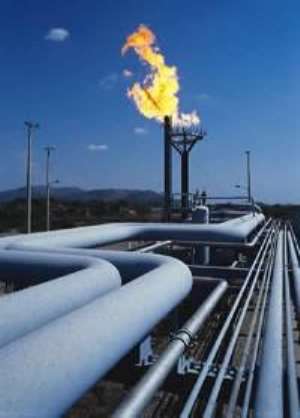
The introduction of commercial production of oil and gas in Ghana over the past years has indeed contributed immensely to the economic structure in the country. Most Ghanaians were hopeful about the discovery of the oil with the idea of restoring all lost hopes and enhance the provision of jobs. Amidst all concerns, the oil and gas sector have supported the country in diverse ways as far as the economic sector is concerned.
Oil was discovered offshore along the Cape Three Points in the Western Region by a consortium after years of prospecting. The discovery which unitized two production wells in the Deep-water Tano block and the West Cape Three Points block was named Jubilee Field which started with a daily production of 80,000 barrels per day and has currently reached a production level of 110,000 barrels per day which is almost at the expected peak of 120.000 barrels per day in the years ahead.
As the law in Ghana commends, a percentage of oil revenue is made available for funding the annual budget and is deposited into a Consolidated Account which is used to support the national budget with parliamentary approval.
Moreover, the production from the Jubilee oil fields has already created job opportunities for many young Ghanaians, others have used the opportunity to also increase their commodities, house rents, among others. The production of the oil in the country has indeed positively improved the lives of many Ghanaians amidst the minor challenges involved.
In January this year, Ghana took another major step towards the realization of energy and power security with the signing of an agreement for the development of the Offshore Cape Three Points (OCTP) integrated oil and gas project. The $7 billion project, being undertaken by ENI Spa in collaboration with Vitol Energy, would see the development of the Sankofa and Gye Nyame fields to provide substantial gas to operate the thermal power plants for 20 years.
Moreover, IFC, a member of the World Bank Group, on Monday, June 9, 2015, signed an $8 million loan agreement with Quantum Oil Terminal Limited, a leading player in the oil and gas sector in Ghana.
According to myjoyonline.com, Quantum Oil Terminal Limited is developing a 55,000 metric ton petroleum products storage facility near the port of Tema, 29 km east of Accra.
The project will help address storage constraints in the petroleum products distribution value chain and reduce shortages in Ghana.
The commercial production of the oil and gas has also opened the doors of Ghana to companies as well as investors who have invested in ensuring the smooth production of oil to gain higher revenue while others are yet to invest in the sector. More partnership, contracts and supports are being received from different countries all over the world to help improve in the oil and gas sector and also to protect and help the livelihoods in the affected communities.
Notwithstanding the success the sector has chalked, some challenges have emerged which need to be transcended.
The most crucial challenge facing Ghana oil and gas sector is the maritime boundary dispute with Cote d’ Ivoire over an area considered to be rich in oil. The disputed oil rich area is estimated to have about two billion barrels of oil reserves and 1.2 trillion cubic feet of natural gas.
In addition to the above challenge, the production of oil and gas has contributed to other effects on the lives of the people living in the communities where the production is concentrated. Most of them live around the coastal area in the country where fishing is their main occupation; hence, they complain that the production of oil is contributing to the low catch of fish currently.
Even though, some form of compensation was given out to them, but more concentration should be given to help such people enjoy the full benefit of the production of oil and gas in their community.
The recent development in the oil and gas sector, increment in revenue (in spite of ups and downs), provision of jobs and other social responsibilities to help reduce poverty reflect that the economic challenges in the country will be ‘a thing of the past’ in the years ahead.
Ghana’s economy is gradually boosting; hence being considered an icon of hope with its efficient establishment of the necessary and relevant laws to guide production and revenue management activities in the oil sector.




 Supreme court declares payment of wages to spouses of President, Vice President ...
Supreme court declares payment of wages to spouses of President, Vice President ...
 Publish full KPMG report on SML-GRA contract – Bright Simons to Akufo-Addo
Publish full KPMG report on SML-GRA contract – Bright Simons to Akufo-Addo
 Kumasi International Airport to begin full operations by end of June
Kumasi International Airport to begin full operations by end of June
 Election 2024: Our ‘real challenge’ is getting ‘un-bothered’ youth to vote – Abu...
Election 2024: Our ‘real challenge’ is getting ‘un-bothered’ youth to vote – Abu...
 [Full text] Findings and recommendations by KPMG on SML-GRA contract
[Full text] Findings and recommendations by KPMG on SML-GRA contract
 Renegotiate SML contract – Akufo-Addo to GRA, Finance Ministry
Renegotiate SML contract – Akufo-Addo to GRA, Finance Ministry
 J.B Danquah-Adu murder trial: Sexy Dondon to Subpoena Ken Agyapong, Ursula Owusu
J.B Danquah-Adu murder trial: Sexy Dondon to Subpoena Ken Agyapong, Ursula Owusu
 Galamsey: Five Burkinabes jailed 20 years each for mining
Galamsey: Five Burkinabes jailed 20 years each for mining
 'It's no crime' – Abu Sakara defends Alan's exit from NPP
'It's no crime' – Abu Sakara defends Alan's exit from NPP
 'We know all your houses, pay your bills now or we’ll disconnect you; we're all ...
'We know all your houses, pay your bills now or we’ll disconnect you; we're all ...
